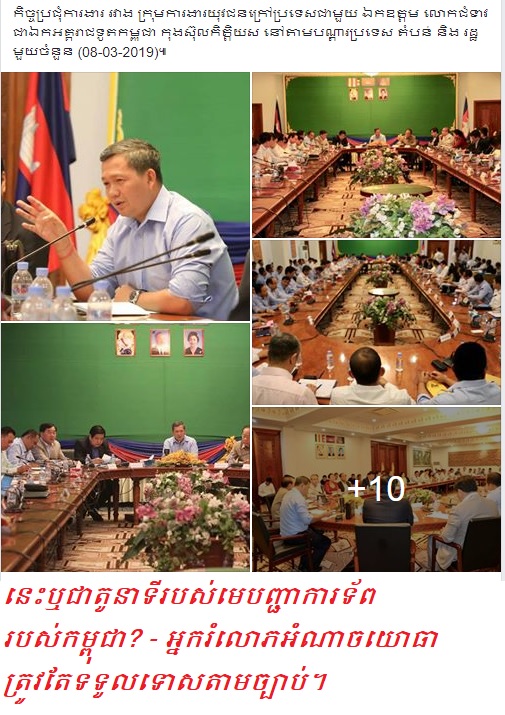Op-Ed: U.S. Department of State

រដ្ឋមន្រ្តីការបរទេសអាមេរិកលោក ម៉ៃឃ៍ ប៉ុមប៉េអូ (Mike Pompeo) ថ្លែងទៅអ្នកសារព័ត៌មាន ប្រកាសរបាយការណ៍សិទ្ធិមនុស្សលើកទី ៤៣ នៃប្រទេសជិត ២០០ នៅក្រសួងការបរទេស នៅថ្ងៃទី ១៣ ខែ មីនា ឆ្នាំ ២០១៩ (RFA khmer)
EXECUTIVE SUMMARY
Cambodia is a constitutional monarchy with an elected parliamentary government. The ruling Cambodian People’s Party (CPP) won all 125 National Assembly seats in the July 29 national election, having banned the chief opposition party in November 2017. Prior to the victory, Prime Minister Hun Sen had already served for 33 years. International observers, including foreign governments and international nongovernmental organizations (NGOs), and domestic NGOs criticized the election as neither free nor fair and not representative of the will of the Cambodian people.
Civilian authorities maintained effective control over the security forces, which often threatened force against those who opposed Prime Minister Hun Sen and were generally perceived as an armed wing of the ruling CPP.
Human rights issues included unlawful or arbitrary killings carried out by the government or on its behalf; forced disappearance carried out by the government; torture by the government; arbitrary arrests by the government; political prisoners; arbitrary interference in the private lives of citizens, including pervasive electronic media surveillance; censorship and selectively enforced criminal libel laws; interference with the rights to peaceful assembly and freedom of association; restrictions on political participation; pervasive corruption, including in the judiciary; and use of forced or compulsory child labor.
The government did not provide evidence of having prosecuted any officials for abuses, including corruption. A pervasive culture of impunity continued.
Section 1. Respect for the Integrity of the Person, Including Freedom from:
a. Arbitrary Deprivation of Life and Other Unlawful or Politically Motivated Killings
There were reports the government or its agents committed arbitrary or unlawful killings. As of July a local human rights NGO reported four extrajudicial killings.
In March 2017 the court sentenced Oeuth Ang to life imprisonment for the 2016 murder of Kem Ley, an outspoken and popular political analyst. As of July the case remained open and the government pledged to look for coconspirators, although it took no action. Noting that the victim and killer were not acquainted and other anomalies, including the impoverished assailant’s possession of an expensive handgun, many observers believed a third party hired Oeuth Ang.
On March 8, violence broke out in Kratie Province when security forces opened fire on persons protesting the transfer of land, decades before, to a rubber plantation. Several media outlets reported a death toll of two to six persons with another 40 injured. Shortly after the violence occurred, the government ordered local media to “correct” its news reports. Four NGOs and the UN Office of the High Commission on Human Rights (OHCHR) formed an investigation committee to tour the site. They found that on March 7, the company began demarcating its land and that a day later 150 soldiers, military police, and police burned down villagers’ houses, leading the villagers to block the main road and demand an immediate stop to the arson. According to the OHCHR report, the security forces opened fire to disperse the villagers. OHCHR acknowledged that, because the security forces closed off the site of the shooting, there were no reliable counts of the dead or injured.
After the incident Kratie governor Sar Chamrong denied reports that security forces shot the protesters. National Police spokesperson Kirt Chantharith claimed villagers with homemade rifles injured as many as seven police officers while only two villagers were slightly injured, not by gunfire, but by bamboo sticks.
b. Disappearance
The Venerable Meas Vichet, a well known monk and social activist who disappeared in June 2017 in Krobei Riel commune, Siem Reap Province, after security officials beat him, remained missing, and no new information on his case arose during the year to October.
c. Torture and Other Cruel, Inhuman, or Degrading Treatment or Punishment
The constitution prohibits such practices; however, beatings and other forms of physical mistreatment of police detainees and prison inmates reportedly continued during the year.
There were credible reports military and police officials used physical and psychological abuse and occasionally severely beat criminal detainees, particularly during interrogation. As of July a local NGO observed physical assaults against detainees and prisoners in nine cases. Journalist Kim Sok told local media following his release from detention that prison guards beat him whenever he disobeyed an order or opened books. Other detainees reported authorities forced them to walk for up to an hour with a bucket of water on their heads, or forced them to stand in the hot sun for several hours.
Continue reading